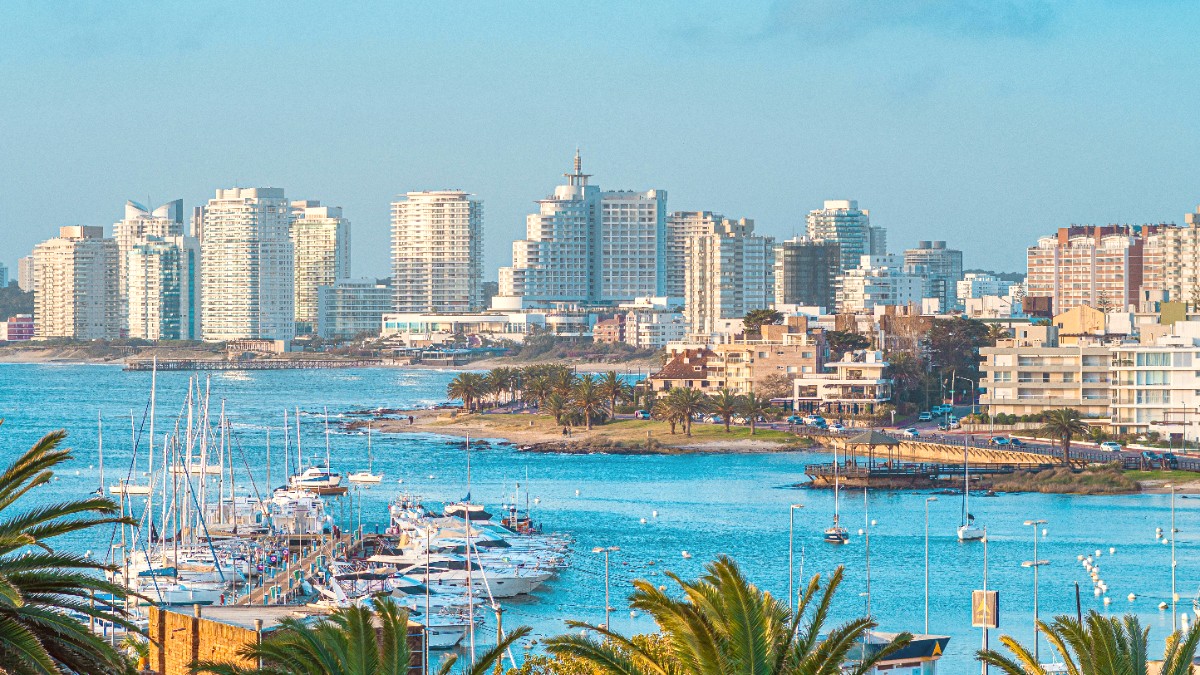
Eastern Uruguay, Uruguay
This is Punta del Este, a resort city that presents both excitement and relaxation. From chic restaurants and bustling markets to quiet natural reserves and artistic landmarks, Punta del Este presents experiences for every preference. Prepare yourself for an unforgettable escape to the Uruguayan coast.
Punta del Este’s story portrays a transformation from a quiet fishing village to a premier international resort. Its history began in the early 20th century, when visionary developers recognized its stunning natural beauty and ideal climate. They began to shape it into an exclusive summer retreat.
The arrival of wealthy families from Montevideo and Buenos Aires helped establish its reputation as a sophisticated getaway. Landmarks like the Lighthouse, built in 1860, speak to its maritime past, while the iconic "Hand Sculpture" (La Mano), created in the 1980s, marks its modern artistic identity. Punta del Este represents a blend of old-world charm and contemporary luxury, a place where history intertwines with modern leisure.
Punta del Este occupies a distinctive geographical position, situated on a slender peninsula that juts into the Atlantic Ocean. This unique placement means it is bordered by the Atlantic to the east, home to the iconic Playa Brava (Wild Beach), and by the calmer waters of the Río de la Plata estuary to the west, where Playa Mansa (Calm Beach) offers sheltered shores.
The city's urban area extends north and east from the peninsula, seamlessly blending into residential areas and the more bohemian vibe of La Barra. Inland, the landscape transitions to rolling hills and agricultural lands, dotted with lagoons and natural reserves, offering a contrast to the coastal bustle. This coastal location shapes its climate and activities.
The eastern boundary, home to Playa Brava.
The western boundary, with the calm waters of Playa Mansa.
Known for its invigorating waves and the "Hand Sculpture."
Offers sheltered shores and stunning sunsets over the estuary.
An undulating landmark connecting to La Barra.
Punta del Este's development reflected Uruguay's economic prosperity and its openness to international tourism. It became a playground for celebrities and jet-setters, earning nicknames like the "Monaco of South America."
It experiences warm, humid summers (December-February) with average temperatures around 20-27°C (68-81°F), making this the peak tourist season. Winters (June-August) are cooler and drier, with temperatures ranging from 8-15°C (46-59°F), offering a quieter experience.
The city presents everything from water sports on its distinct beaches (Playa Mansa for calm waters, Playa Brava for surf) to fine dining and lively nightlife. Landmarks like the "Hand Sculpture" and the unique Casapueblo, an architectural marvel, draw visitors for their artistic and scenic appeal.
Punta del Este presents a blend of natural beauty, cultural experiences, and sophisticated leisure, making it a compelling destination for a diverse range of visitors.
This snapshot gives you a quick overview of aspects for travelers visiting Punta del Este.
Average 20-27°C (68-81°F) from December to February.
Like the "Hand Sculpture" and Casapueblo.
For many countries (US, Canada, EU) up to 90 days.
The local currency is the Uruguayan Peso (UYU), with credit cards widely accepted. VAT refunds are available for tourists on certain services.
The city buzzes with activity, and the port area often hosts sea lions. Local buses offer easy transport within the city.